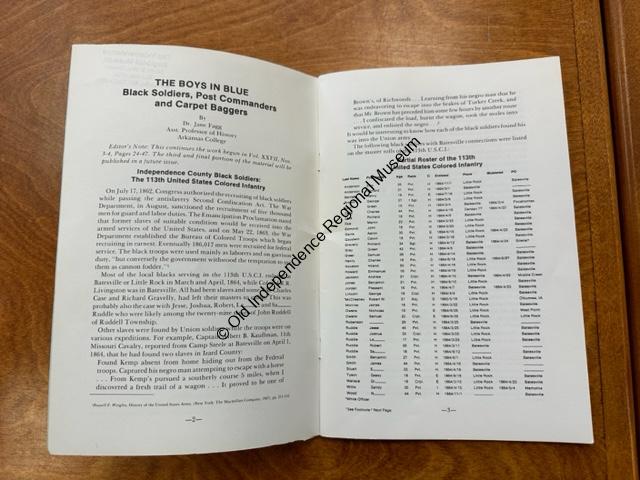Charles Case
Charles Case led a full, extremely interesting life in our home city of Batesville. He is remembered as the first black minister registered in Batesville, a Union soldier, a carpenter, farmer, land developer, as a trustee of the Freedman’s School, and as the first black elected official in Independence County. All these feats he managed to accomplish after his early life as a slave.
Charles was born in 1820 to Susan Finley, a privileged woman because of her occupation as a midwife, which allowed her the “freedom” to travel to different plantations to deliver babies. Born Charles Finley, the last name of “Case” was not taken until he was purchased in 1849 to George Case, a carpenter and merchant in Batesville. As George’s slave, he hauled lumber and planks, built windows, fan mills, coffins, furniture, houses, and outbuildings.
In 1852, George purchased Caladona Powell, who married Charles in 1855 in a formal ceremony at the Case home.
The Civil War brought great and grave changes to our country, and Arkansas had a fair mix of Union and Confederate sympathizers. Many individuals who owned slaves were shocked their “property” would choose to serve in the army, who promised freedom to any soldier ready to dedicate at least three years to the war effort. Charles joined Captain James M. Bowler in the Arkansas Infantry Volunteers (Colored) on April 16, 1864 (later that year they became the 112th United States Colored Infantry). Case rose to the rank of sergeant rather quickly. He was hospitalized intermittently from 1865 until 1866 when he was released from service.
Charles and Caladona settled in Batesville (Caladona had lived in Little Rock while Charles served his military duty) in 1870. Charles was still not entirely healthy and suffered poor health and a troubling cough. Caladona and Charles’s friends remembered him as a “thin, sickly man” after the war, and he often walked with the aid of a cane. His health was supervised by his mother, who treated him until her death in 1876.
In 1867, Charles and other trustees purchased land for the new Freedmen’s Bureau school. He followed with his appointment as the coroner of Independence County, which his former owner, George Case, had occupied in the past. Shortly thereafter, in 1872, Charles was granted a license to preach by the quarterly conference of Batesville Station of Little Rock District of Arkansas Annual Conference of Colored Methodist Episcopal Church in America. Along with this appointment, he conducted dozens of marriages for his congregants, and his eloquent sermons were remembered fondly.
Charles’s health deteriorated in 1883 and he died after a serious bout of pneumonia. He left a lasting impression on those who were close to him as well as the town of Batesville. It is an honor to know and remember his history.

